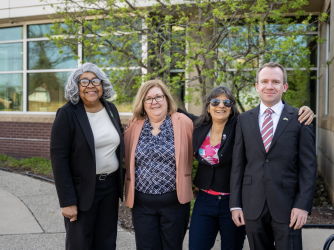Table of Contents
SUNY Geneseo: We never considered discipline in Snapchat photo investigation

(Inkdrop / Shutterstock)
The State University of New York at Geneseo tells FIRE it never considered disciplining two students for Snapchat photos posted earlier this month that referenced blackface — even though university police were called to one of the students’ dorm rooms and Geneseo President Denise Battles sent a campus-wide email promising an investigation.
“The reported behavior is deeply disturbing, reprehensible, and wholly inconsistent with the values of this College,” Battles wrote on April 2, one day after the photos were posted. “Please know that the matter has the full attention of the College’s leadership. Members of the College administration were immediately notified, and the situation is currently under investigation.”
FIRE sent a letter to Battles late last week reminding the public university that even “disturbing, reprehensible” speech is protected under the First Amendment, and while Geneseo may join community members in vociferously criticizing the photos, a public university may not investigate or take disciplinary action against the students involved.
In a response to our letter, an attorney for the State University of New York said yesterday that Geneseo “never investigated, nor planned to investigate, any student for discipline in this case.”
“Be assured,” SUNY attorney Seth Bauguess wrote, “the College has not and will not take any action, including but not limited to opening a disciplinary investigation, that would impermissibly violate or chill the First Amendment rights of its students.”
While difficult to square with the university’s previous public statements, this reaffirmation of the institution’s obligations under the First Amendment is a welcome development.
Snapchat Controversy
On April 1, a Snapchat account under the username “Maddie” posted two photos in succession. The first showed a woman posing against a sunset wearing a charcoal facemask, along with the caption “Blackface and sunsets with my bae.” The second photo featured a close-up of both women, with each wearing the charcoal masks, and the caption “[just kidding] they’re facemasks.”
The photos caused an almost immediate uproar on Geneseo’s campus, and Battles sent her email the following day. The photos also received criticism on Twitter:
Geneseo’s student newspaper, The Lamron, devoted much of its coverage in subsequent days to the matter, including publishing an op-ed entitled, “Geneseo fails students by allowing racist acts to slide,” and providing student reaction to the university’s inaction, and demands that Geneseo discipline, suspend, or expel the students in the photos.
The Lamron also posted an interview with Maddie herself, without fully identifying her, at her request. In the interview, Maddie expressed regret over the controversy, and revealed that police visited her dorm room soon after she posted the photos. She also said she had met with at least one Geneseo administrator and talked with other Geneseo students.
I talked with [Geneseo’s Chief Diversity Officer] and they kind of helped me get to a better place mentally. I’ve had a lot of interactions with people who don’t like me at this point and I’m getting kind of getting good at it. . . I’ve had a lot of conservations [sic] with people who don’t like me and I’m learning more about the impact that I had on people, which I was ignorant to. The fact that I haven’t slept and haven’t eaten isn’t helping my ability to put words together… The [college] has stayed impartial. They don’t want to be on my side and they, at least talking to me, don’t want to be on others’ side either. They just strictly want to find how to fix this. I have been extremely apologetic because I’ve realized how this has made [people] feel. It’s more a matter of what’s done is done, so let’s pick up the pieces. . .
FIRE Letter and Geneseo Response
While FIRE is heartened to hear that the students involved in the controversy will not be formally disciplined, courts have repeatedly ruled that even investigations, or announcements of potential investigations, into protected speech are a form of discipline that chills protected expression. As we wrote in our letter:
Although details of Geneseo’s investigation into the Snapchat posts remain unclear, the First Amendment is not violated only when an investigation culminates in the imposition of formal discipline. The impermissible chilling effect on First Amendment rights may precede the imposition of final, formal discipline, instead arising from the initiation, announcement, and maintenance of an investigation into speech.
…
Here, Geneseo’s investigation has apparently utilized its on-campus police officers to confront Maddie in her dormitory room. The university has likewise announced, in a message broadcast to all members of the community, that the offending image has the “full attention” of the institution’s leadership, and that the institution had initiated an “investigation” into the image.
“The chilling effect risked by dispatching law enforcement officers to the dormitory room of a student whose protected expression offends others cannot be understated,” we wrote. “Announcing investigations into clearly-protected expression and dispatching law enforcement over offensive expression sets a chilling precedent.”
In our letter, we also urged Geneseo to consider the effectiveness of using more speech, not punishment, to counteract speech others find offensive — an approach Maddie said helped educate her about the impact of her speech on others:
To be sure, offensive expression is not free from consequence. “Maddie” has indicated that she has experienced social repercussions and difficult conversations with others who were offended by her expression. So, too, is Geneseo’s administration free to join members of its community in condemning or criticizing Maddie’s expression. These consequences are “more speech” responses to offensive expression. Investigations and the use of law enforcement to convey the possibility of formal discipline are not, and public anger cannot and must not lead to the subordination of Geneseo students’ expressive rights. By investigating speech that is plainly protected by the First Amendment, the university has unacceptably threatened the expressive rights of its students and faculty.
We hope SUNY Geneseo will continue to take a “more speech” approach to dealing with these sorts of controversies, and clarify to the campus community that protected expression will not be investigated at their university.
Recent Articles
FIRE’s award-winning Newsdesk covers the free speech news you need to stay informed.

VICTORY: Michigan town declares Sept. 6 ‘First Amendment Day’ after FIRE sues its mayor for shouting down residents

USC canceling valedictorian’s commencement speech looks like calculated censorship

Back into the FIRE: Hasen’s response to FIRE and Rohde: Don’t read the press clause out of the Constitution — First Amendment News 420
